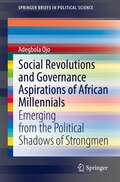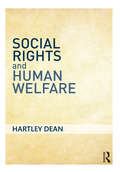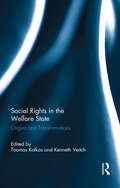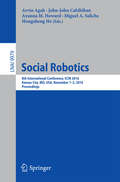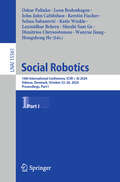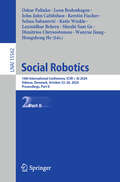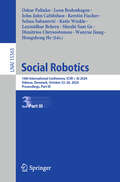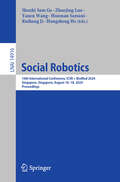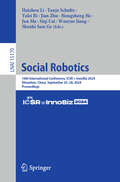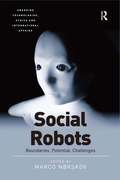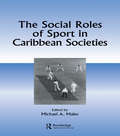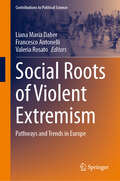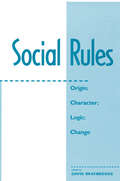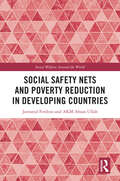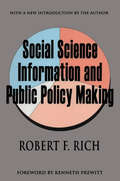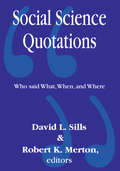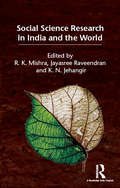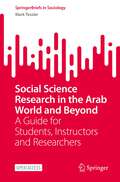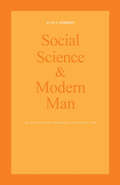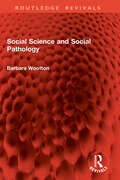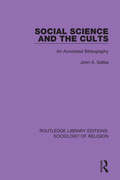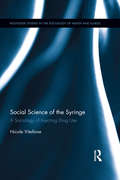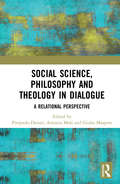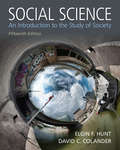- Table View
- List View
Social Revolutions and Governance Aspirations of African Millennials: Emerging from the Political Shadows of Strongmen (SpringerBriefs in Political Science)
by Adegbola OjoThis book discusses the role of millennials in political leadership and governance in Africa going forward. Africa is in the process of significant change. The nature of this change, dimensions, and what change might bring will depend on young people who now represent three quarters of the population of the continent. This book contributes to ongoing discussions and provides a pathway and guide for a new generation of young African leaders to emerge and not to miss the opportunity for real transformative change.The book provides a thought-provoking analysis of the political and economic systems in Africa. In its analysis of development challenges and opportunities, it shows how millennials can be the catalyst for change in leadership and governance behavior. Consequently, the book argues how this can improve the fortunes of Africa's estimated 1.3 billion people. It is inspired by the factual circumstances of Africa’s significant history, a deep understanding of current power relations, and motivated by an ambitious vision of Africa’s role in the world.The book combines a deep explanation of concepts with a range of techniques and recent illustrative applications. It also embraces a multi-method approach that allows for the embedding of primary and secondary forms of data. A cross-fertilization of ontological arguments and analytical techniques from a range of allied disciplines further contribute to the book’s novelty. The book appeals to multiple stakeholders including students, researchers, practitioners, and policy-makers.
Social Rights and Human Welfare
by Hartley DeanAn essential introduction to rights-based approaches in social policy, this text critically explores how social rights underpin human wellbeing. It discusses social rights as rights of citizenship in developed welfare states and as an essential component within the international human rights and human development agenda. It provides a valuable introduction for students and researchers in social policy and related applied social science, public policy, sociology, socio-legal studies and social development fields. Taking an international perspective, the first part of the book considers how social rights can be understood and critiqued in theory – discussing ideas around citizenship, human needs and human rights, collective responsibility and ethical imperatives. The second part of the book looks at social rights in practice, providing a comparative examination of their development globally, before looking more specifically at rights to livelihood, human services and housing as well as ways in which these rights can be implemented and enforced. The final section re-evaluates prevailing debates about rights-based approaches to poverty alleviation and outlines possible future directions. The book provides a comprehensive overview of social rights in theory and practice. It questions recent developments in social policy. It challenges certain dominant ideas concerning the basis of human rights. It seeks to re-frame our understanding of social rights as the articulation of human needs and presents a radical new 'post-Marshallian' theory of human rights.
Social Rights in the Welfare State: Origins and Transformations
by Toomas Kotkas Kenneth VeitchAt a time when the future of the welfare state is the object of heated debate in many European countries, this edited collection explores the relationship between this institution and social rights. Structured around the themes of the politics of social rights, questions of equality and social exclusion/inclusion, and the increasing impact of market imperatives on social policy, the book explores the effect of transformations in the welfare state upon social rights and their underlying rationalities and logics. Written by a group of international scholars, many of the essays discuss a number of urgent and topical issues within social policy, including: the social rights of asylum seekers; the increasing marketization and consumerization of public welfare services; the care of the elderly; and the obligation to work as a condition of access to welfare benefits. International in its scope, and interdisciplinary in its approach, this collection of essays will appeal to scholars and students working in the fields of law and socio-legal studies, sociology, social policy, and politics. It will also be of interest to policy makers and all those engaged in the debate over the future of the welfare state and social rights.
Social Robotics
by Arvin Agah John-John Cabibihan Ayanna M. Howard Miguel A. Salichs Hongsheng HeThis book constitutes the refereed proceedings of the 8th International Conference on Social Robotics, ICSR 2016, held in Kansas City, MO, USA, in November 2016. The 98 revised full papers presented were carefully reviewed and selected from 107 submissions. The theme of the 2016 conference is Sociorobotics: Design and implementation of social behaviors of robots interacting with each other and humans. In addition to technical sessions, ICSR 2016 included three workshops: The Synthetic Method in Social Robotics (SMSR 2016), Social Robots: A Tool to Advance Interventions for Autism, and Using Social Robots to Improve the Quality of Life in the Elderly.
Social Robotics: 16th International Conference, ICSR + AI 2024, Odense, Denmark, October 23–26, 2024, Proceedings, Part I (Lecture Notes in Computer Science #15561)
by Shuzhi Sam Ge John-John Cabibihan Hongsheng He Laxmidhar Behera Dimitrios Chrysostomou Wanyue Jiang Selma Šabanović Oskar Palinko Leon Bodenhagen Kerstin Fischer Katie WinkleThe 3-volume set LNAI 15561-15563 constitutes the refereed proceedings of the 16th International Conference on Social Robotics, ICSR + AI 2024, held in Odense, Denmark, during October 23–26, 2024. The 109 full papers and 19 short papers included in the proceedings were carefully reviewed and selected from 182 submissions. The theme of this year's conference was "Empowering Humanity: The Tole of Social and Collaborative Robotics in Shaping Our Future". The contributions focus on social robotics and AI across the domains of the visual and performing arts, including design, music, live performance, and interactive installations.
Social Robotics: 16th International Conference, ICSR + AI 2024, Odense, Denmark, October 23–26, 2024, Proceedings, Part II (Lecture Notes in Computer Science #15562)
by Shuzhi Sam Ge John-John Cabibihan Hongsheng He Laxmidhar Behera Dimitrios Chrysostomou Wanyue Jiang Selma Šabanović Oskar Palinko Leon Bodenhagen Kerstin Fischer Katie WinkleThe 3-volume set LNAI 15561-15563 constitutes the refereed proceedings of the 16th International Conference on Social Robotics, ICSR + AI 2024, held in Odense, Denmark, during October 23–26, 2024. The 109 full papers and 19 short papers included in the proceedings were carefully reviewed and selected from 182 submissions. The theme of this year's conference was "Empowering Humanity: The Tole of Social and Collaborative Robotics in Shaping Our Future". The contributions focus on social robotics and AI across the domains of the visual and performing arts, including design, music, live performance, and interactive installations.
Social Robotics: 16th International Conference, ICSR + AI 2024, Odense, Denmark, October 23–26, 2024, Proceedings, Part III (Lecture Notes in Computer Science #15563)
by Shuzhi Sam Ge John-John Cabibihan Hongsheng He Laxmidhar Behera Dimitrios Chrysostomou Wanyue Jiang Selma Šabanović Oskar Palinko Leon Bodenhagen Kerstin Fischer Katie WinkleThe 3-volume set LNAI 15561-15563 constitutes the refereed proceedings of the 16th International Conference on Social Robotics, ICSR + AI 2024, held in Odense, Denmark, during October 23–26, 2024. The 109 full papers and 19 short papers included in the proceedings were carefully reviewed and selected from 182 submissions. The theme of this year's conference was "Empowering Humanity: The Tole of Social and Collaborative Robotics in Shaping Our Future". The contributions focus on social robotics and AI across the domains of the visual and performing arts, including design, music, live performance, and interactive installations.
Social Robotics: 16th International Conference, ICSR + BioMed 2024, Singapore, Singapore, August 16–18, 2024, Proceedings (Lecture Notes in Computer Science #14916)
by Shuzhi Sam Ge Hongsheng He Hooman Samani Zhuojing Luo Yanen Wang Ruihang JiThis book constitutes the refereed proceedings of the 16th International Conference on Social Robotics, ICSR + BioMed 2024, held in Singapore during August 16-18, 2024. The 28 full papers included in this book were carefully reviewed and selected from 102 submissions. The ICSR + BioMed 2024 conference emphasized interdisciplinary innovations in Bio-inspired, Biomedical, and Surgical Robotics.
Social Robotics: 16th International Conference, ICSR + InnoBiz 2024, Shenzhen, China, September 25–28, 2024, Proceedings (Lecture Notes in Computer Science #15170)
by Jun Ma Shuzhi Sam Ge Tanja Schultz Hongsheng He Haizhou Li Wanyue Jiang Yalei Bi Jian Zhu Siqi CaiThis book constitutes the refereed proceedings of the 16th International Conference on Social Robotics, ICSR + InnoBiz 2024, held in Shenzhen, China, during September 25–28, 2024. The 36 full papers included in this book were carefully reviewed and selected from 82 submissions. The theme of this year’s conference was “Social Robotics: Embracing Innovation for Business”, focusing on recent technological innovation in the robotic industry.
Social Robots: Boundaries, Potential, Challenges (Emerging Technologies, Ethics and International Affairs)
by Marco NørskovSocial robotics is a cutting edge research area gathering researchers and stakeholders from various disciplines and organizations. The transformational potential that these machines, in the form of, for example, caregiving, entertainment or partner robots, pose to our societies and to us as individuals seems to be limited by our technical limitations and phantasy alone. This collection contributes to the field of social robotics by exploring its boundaries from a philosophically informed standpoint. It constructively outlines central potentials and challenges and thereby also provides a stable fundament for further research of empirical, qualitative or methodological nature.
Social Roles Of Sport In Carib
by Michael A MalecFirst Published in 2004. Routledge is an imprint of Taylor & Francis, an informa company.
Social Roots of Violent Extremism: Pathways and Trends in Europe (Contributions to Political Science)
by Francesco Antonelli Liana Maria Daher Valeria RosatoThis volume examines the environments that enable radicalization and extremism today, drawing from extensive European research, based on the Horizon 2020 project PARTICIPATION. Examining theoretical and practical studies, the book analyzes how the erosion of institutional integration, social participation, and political stability among marginalized groups can lead to feelings of deprivation, alienation, and self-victimization. In these environments, individuals - often from disadvantaged or immigrant backgrounds - rebuild their identities through extremism, finding a sense of belonging in radical, and sometimes violent ideas that are easily accessible online. The book further sheds light on this paradox of modern extremism: while extremists embrace technological tools like digital platforms, they reject core modern values such as personal freedom and cultural diversity. This volume argues for innovative approaches to radicalization, emphasizing prevention through the creation of inclusive social environments and critical dialogue on the role of digital technology in radical movements.
Social Rules: Origin; Character; Logic; Change (Toronto Studies In Philosophy)
by David BraybrookeThis collection is a pioneering effort to bring together in fruitful interaction the two dominant perspectives on social rules. One, shared by philosophers, lawyers, anthropologists, and sociologists, directly invites formalization by a logic of rules. The other, originating with economists, emphasizes cost considerations and invites mathematical treatment, often in game-theoretical models for problems of coordination?models that some philosophers have taken up as well.Each perspective is represented by new and recent work that moves this important topic toward increased conceptual precision and deeper insight. As a whole, the collection strikes a balance between historical illustrations and theoretical argument, offering in both a rich body of suggestions for further work.
Social Safety Nets and Poverty Reduction in Developing Countries (Social Welfare Around the World)
by AKM Ahsan Ullah Jannatul FerdousThis book investigates the origins, current state, and fundamental value of social safety nets in developing countries, as well as their effectiveness in these settings. Social safety net programs (SSNPs) are critical because they keep those who are already vulnerable from falling deeper into poverty. Analysing how social safety nets benefit the most disadvantaged and marginalized members of society by allowing those in need to become financially stable, more resilient, and open up more opportunities for themselves, this book shows that social safety nets (SSNs) are a collection of social services designed to protect people from the effects of economic and emotional hardship. Showing that the purpose of the safety net is not to provide permanent financial security, but rather to provide temporary financial security during periodic shocks and how this applies in South Asia and also in parts of Africa, this book will be of interest to all scholars and students of social policy, sociology, social work, and Global South politics more generally.
Social Science As Moral Inquiry
by Robert N. Bellah Paul Rabinow William Sullivan Norma HaanThe papers in this volume arise out of a sense of unease shared in greater or lesser degree by all the contributors. The unease concerns first of all the relation of social science as presently practiced to the realm of ethics. "Value neutrality," itself a term far from clear, now seems without foundation as a guide in this area, but no forceful alternative has yet gathered a consensus. But the unease, among a number of the contributors, goes deeper than a worry about the moral meaning of social science. It includes a worry about the moral meaning of modern society itself. Social science and modern society were born together and their fates are deeply intertwined.
Social Science Information and Public Policy Making
by Robert F. RichA survey of federal officials reveals the belief that government should make the fullest possible use of social science information-and yet most of the information developed by social scientists winds up in specialized libraries or data banks, where it remains unused. Why don't public officials make greater use of the information social scientists develop? What can social scientists do to ensure that their findings are used? To answer these and related questions, Robert Rich reports the results of a unique experiment designed to facilitate the use of research data by public officials in federal agencies. Rich interviewed both researchers and users of research data over the two-year life of a Continous National Survey (CNS) experiment to discover the extent to which the CNS mechanism was successful and to record the levels and types of use that officials made of the data provided. Rich reveals that factors such as the timeliness, cost, and relevance of data do not guarantee that information will be used. He examines patterns in the actual use of survey data by agency officials and explores key organizational factors, such as the compatibility of information with various bureaucratic interests. He discusses the preoccupation of public officials with bureaucratic issues regarding the ownership and control of information, identifies the incentives that prompt bureaucrats to pass along new information and the government officials' difficulties in developing policies and programs for meeting national needs. Rich notes that studies of knowledge inquiry systems, found in the research literature of many social science disciplines have been dominated by a "rationalistic bias." This "bias" is expressed in terms of the belief that the act of acquiring information will automatically lead to its use, in turn, automatically leading to improved policy or decisions. He contends that empirical studies of how information is actually used do not support the assumptions of rational choice theory. The new chapter also discusses types of information, knowledge, and use; prospects for the development of learning organizations in government; and the politics of expertise. This book will be of interest to social scientists and public policy makers. Robert F. Rich is professor of law and political science at the University of Illinois at Urbana-Champaign. He is also professor in the Institute of Government and Public Affairs, and was the director of that Institute from 1986-1997. He is the founding editor of Knowledge: Creation, Diffusion, Utilization (now Science Communication).
Social Science Quotations: Who Said What, When, and Where (Social Science Quotations Ser. #Vol. 19)
by Robert K. Merton David L. SillsSocial Science Quotations has been prepared to meet an evident, unmet need in the literature of the social sciences. Writings on the lives and theories of individual social scientists abound, but there has been no fully documented collection of memorable quotations from the social sciences as a whole. The frequent use of quotations in scientific as well as literary writings that are mere summaries or paraphrases typically fail to capture the full force of formulations that have made quotations memorable. This book of quotations invites the further reading or rereading of the original texts, beyond the quotations themselves. Sills and Merton draw extensively upon the writings that constitute the historical core of the social sciences and social thought; those works with staying power often described as the "classical texts." Many quotations have been drawn from these classical texts because the quotations contain memorable ideas memorably expressed. Both consequential and memorable, these words have been quoted over the generations, entering into the collective memory of social scientists everywhere and at times diffusing into popular thought and into the vernacular as well. This book is useful to social scientists, anthropologists, economists, historians, political scientists, psychiatrists, psychologists, sociologists and statisticians, and for all who want to learn or verify memorable formulations and phrases concerning social thought and social theories. It is particularly useful for graduate students taking courses that examine the history of their discipline.
Social Science Research in India and the World
by R. K. Mishra Jayasree Raveendran K. N. JehangirA unique and comprehensive study on social science research, this book highlights the status, issues, roadblocks and challenges of the field in India and certain select nations of the world. It conducts key cross-comparisons with existing literature in the area, and discusses aid policies and decisions, funding dynamics and quality of research as well as assessment systems in social science research.
Social Science Research in the Arab World and Beyond: A Guide for Students, Instructors and Researchers (SpringerBriefs in Sociology)
by Mark TesslerThis book presents and discusses the logic and method of social science research adapted mainly for instruction at Arab universities and for research in Arab countries, but with applicability beyond the region. It illustrates major concepts and methods pertaining to research with examples of previous studies carried out in the Arab world and with exercises using Arab Barometer and other datasets. The book situates itself between a regular methods textbook and an annotated list of major concepts and methods, and includes an introduction, three chapters, and four appendices.
Social Science and Modern Man: Alan B. Plaunt Memorial Lectures 1969
by Scott GordonThe main theme of these lectures is man's struggle to understand himself as a social being. The author argues that the chief inspiration for this effort, insofar as it has been successful, has been the rationalist philosophy of physical science, and that constructive social science has been based on this philosophy rather than upon theology and ethical philosophy. He goes on to discuss the major problems confronting man in his attempts to come to grips with the modern social world - problems of social and political organization, of equality and aspiration, of intellect and reason - and ends with a plea for liberalism and rationalism as the political and intellectual foundations of freedom and progress. This fascinating and thought-provoking apology for liberalism and the social scientist will be valuable reading for anyone interested in problems facing them both today.
Social Science and Social Pathology (Routledge Revivals)
by Barbara WoottonOriginally published in 1959, this book critically examines, in the light of numerous research, both the relation between unacceptable behaviour and economic and social status and the validity of several popular hypotheses of the 20th Century: that anti-social attitudes are due to lack of maternal affection in infancy, or that problem families produce problem families generation after generation. The author discusses the factors affecting the growth of modern psychiatry and how this shaped attitudes towards anti-social behaviour and conceptions of social work. The final section of the book considers the wider methodological implications.
Social Science and the Cults: An Annotated Bibliography (Routledge Library Editions: Sociology of Religion #15)
by John A. SalibaThis book, first published in 1990, brings together descriptive, comparative, and theoretical materials on cults and sects in Western culture, focusing on literature published since 1970. A historical section links the rise of the new movements to similar past phenomena in Western culture. Other sections examine the methodology of studying religious movements and the various theories which have been brought to explain them, current studies on traditional sects that are sometimes compared to the new religions, and many studies of individual contemporary cults.
Social Science of the Syringe: A Sociology of Injecting Drug Use
by Nicole VitelloneThis book addresses the history of harm reduction. It evaluates the consequences and constraints, stakes and costs of the policy of needle exchange for the purposes of harm prevention and health research. Vitellone situates the syringe at the centre of empirical research and theoretical analysis, challenging existing accounts of drug injecting which treat the syringe as a dead device that simply facilitates social action between humans. Instead, this book complicates the relationship between human and object – injecting drug user and syringe – to ask what happens if we see the object as an intra-active part of the sociality that constitutes injecting practices. And what kinds of methods are required to generate a social science of the syringe that is able to measure injecting sociality? Social Science of the Syringe develops material methodologies and epistemologies of injecting drug use to enact the syringe as an object of intellectual inquiry. It draws on the methodologies of social anthropology, Actor-Network-Theory, Deleuze’s empiricism and new feminist materialism to move towards materially-engaged knowledge production. This interdisciplinary approach improves understandings of the causes and effects of injecting behaviour and the problem of needle sharing, as well as providing a more robust empirical framework to evaluate the motivations and consequences of drug use and drug policy. This book will appeal to researchers and students interested in the sociology of health and illness, STS, Actor-Network Theory, empirical sociology, medical anthropology, social and cultural anthropology, addiction theory and harm reduction.
Social Science, Philosophy and Theology in Dialogue: A Relational Perspective
by Pierpaolo Donati Giulio Maspero Antonio MaloThis volume explores the potential of employing a relational paradigm for the purposes of interdisciplinary exchange. Bringing together scholars from the social sciences, philosophy and theology, it seeks to bridge the gap between subject areas by focusing on real phenomena.Although these phenomena are studied by different disciplines, the editors demonstrate that it is also possible to study them from a common relational perspective that connects the different languages, theories and perspectives which characterize each discipline, by going beyond their differences to the core of reality itself. As an experimental collection that highlights the potential that exists for cross-disciplinary work, this volume will appeal to scholars across a range of field concerned with critical realist approaches to research, collaborative work across subjects and the manner in which disciplines can offer one another new insights.
Social Science: An Introduction to the Study of Society -- Pearson eText
by David C. Colander Elgin F. HuntSocial Science, 15/e, approaches social science from a common-sense perspective, rather than from a conventional social science angle. Readers will see how seemingly diverse disciplines intermingle – anthropology and economics, for example. In the end, students will be able to approach social issues with unbiased problem-solving skills.
